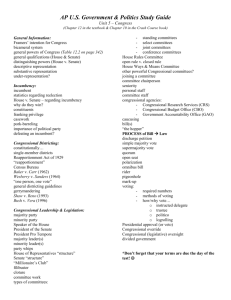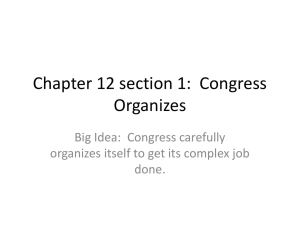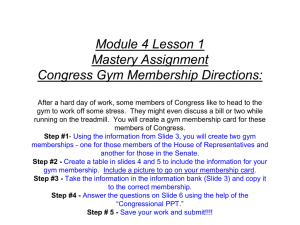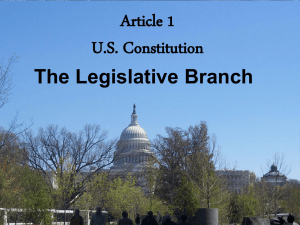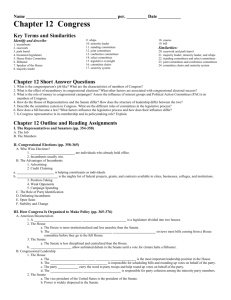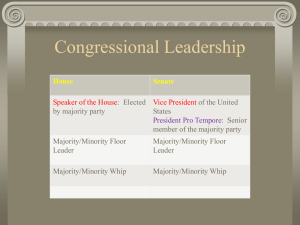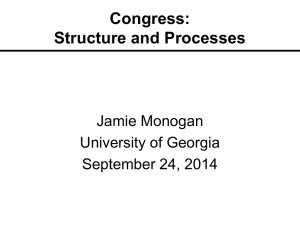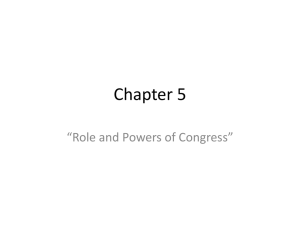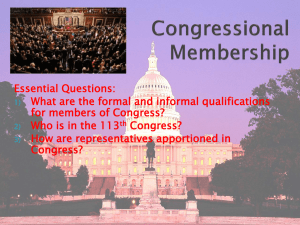APGOV Power Point chapter 7
advertisement
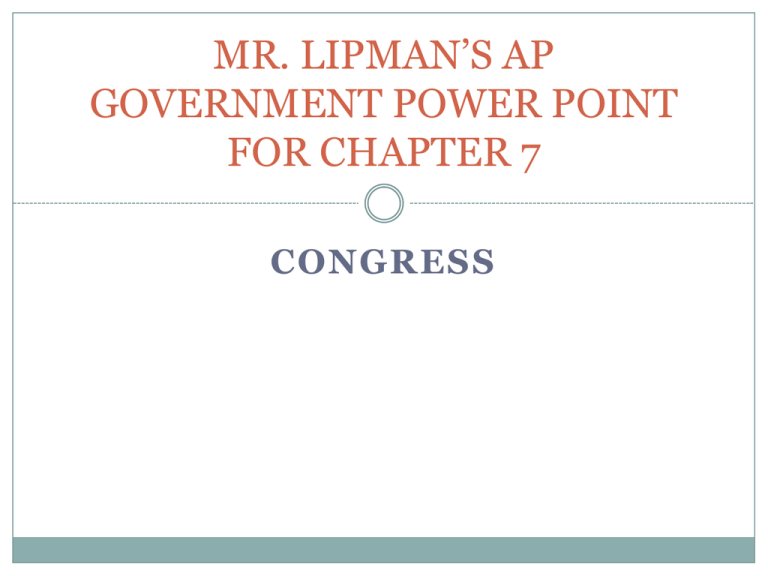
MR. LIPMAN’S AP GOVERNMENT POWER POINT FOR CHAPTER 7 CONGRESS THE BASICS Three way battle for power with Judiciary and Executive Direct election of Senators-17th Amendment Two houses in one branch Census / Apportionment / Redistricting All power stems from Article I – Section 8 435 members for house and 100 for Senate In 2003, Texas Democrats left the state in order to hold off the necessary quorum needed by Republicans to do what? A.Take control of the legislature B.Pass an affirmative action bill C.End the death penalty in Texas D.Pass a Republican-sponsored redistricting bill E.Pass a bill requiring the state board of education to stay out of the process of textbook selection In 2003, Texas Democrats left the state in order to hold off the necessary quorum needed by Republicans to do what? A.Take control of the legislature B.Pass an affirmative action bill C.End the death penalty in Texas D.Pass a Republican-sponsored redistricting bill E.Pass a bill requiring the state board of education to stay out of the process of textbook selection Figure 7.2: What is gerrymandering? A bill, or proposed law, cannot become law without the consent of what entity? A. The Senate B. The House C. Both the House and Senate D. The Bill Committee E. The people A bill, or proposed law, cannot become law without the consent of what entity? A. The Senate B. The House C. Both the House and Senate D. The Bill Committee E. The people THE BASICS House members must be 25 Senate members must be 30 All members must live in their “districts” Impeachment process starts in house All revenue bills must start in house Speaker of house is 3rd in line Senate Pro-Tem is 4th in line (seniority) Vice-President only votes in case of a tie Table 7.1: What are the powers of Congress? TYPES OF COMMITTEES Standing Committees (permanent) Joint Committees ( house and senate) Conference Committees (bill reconciliation) Select/Special Committees (temporary) Bills can be forced out of a House committee by what? A. A majority vote B. A two-thirds vote C. A chairperson D. A discharge petition E. A majority leader Bills can be forced out of a House committee by what? A. A majority vote B. A two-thirds vote C. A chairperson D. A discharge petition E. A majority leader TYPES OF COMMITTEES CON’T Oversight Committees: Job is to oversee the executive agencies that are involved in regulation to insure that they are carrying out the intent of the law that created them. Congressional Review: allows congress to nullify an agency regulation within 60 days of its becoming effective. Figure 7.3: How are the House of Representatives and the Senate organized? COMMITTEES CONTINUED House “rules” committee is key and members are selected by “Speaker”. Majority and Minority leaders pick committee appointments except for rules committee Committee chair now limited to six years in house but no limit in Senate Table 7.5: What were the committees of the 111th Congress? How does a bill become a law? JOB OF THE ELECTED Pork (bill creating jobs or money for district) Logrolling (rep. votes in favor of colleague bill in exchange for return favor) Serving two distinct groups: - Party leaders, colleagues and lobbyists Constituents (voters back home) 1) Trustee: rep who votes best judgment 2) Delegate: votes the way constituents want 3) Politico: votes a combination of 1 and 2 Congressional Support Agencies 1. Congressional Budget Office (CBO) 2. Congressional Research Service (CRS) 3. General Accountability Office (GAO) More than 9000 bills are introduced each year but less than 10% of them will become law THE SENATE Hold : Allows a senator to be notified before action is taken on a bill Filibuster: Unlimited debate so nothing else can be taken up Cloture vote: 60 members can stop a filibuster THE SENATE CON’T Must approve all high level executive appointments by a majority vote Must approve all federal judges by a majority vote Must approve all foreign treaties by a 2/3 vote Senatorial Courtesy: Senator gets to select judge to fill a seat in his/her state when vacancy occurs (if President goes along with it) DECLARING WAR Only Congress can declare war War Powers Act passed to limit President’s power to commit forces in foreign lands without Congressional approval Congress appropriates all funds and thus can also stop armed forces on foreign soil by not approving funds (not easy to do) The War Powers Act of 1973 has been considered by many to be what? A.Quite powerful B.A success C.Largely ineffective D.Unconstitutional E.Both C and D The War Powers Act of 1973 has been considered by many to be what? A.Quite powerful B.A success C.Largely ineffective D.Unconstitutional E.Both C and D PRESIDENTS POWER OVER A BILL 1. Sign it 2. Veto it 3. Do nothing and after 10 days it becomes law if Congress is still in session 4. Pocket Veto: Do nothing and Congress adjourns before 10 days elapse it will become a veto The Tenure of Office Act was passed to do what? A.Ensure tenure of members of Congress B.Prevent Franklin D. Roosevelt from removing Supreme Court justices he disagreed with C.Prevent President Andrew Johnson from removing Lincoln cabinet appointees D.Prevent President Bill Clinton from firing insubordinate bureaucrats E.Ensure that Supreme Court justices would have their positions for life The Tenure of Office Act was passed to do what? A.Ensure tenure of members of Congress B.Prevent Franklin D. Roosevelt from removing Supreme Court justices he disagreed with C.Prevent President Andrew Johnson from removing Lincoln cabinet appointees D.Prevent President Bill Clinton from firing insubordinate bureaucrats E.Ensure that Supreme Court justices would have their positions for life
